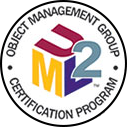Thank you for sending your enquiry! One of our team members will contact you shortly.
Thank you for sending your booking! One of our team members will contact you shortly.
 Certificate
Certificate
Course Outline
Basic Structure
- Backus-Naur Form (BNF)
- Namespaces
- Types & Multiplicity
- Constraints
- Dependencies
- Time
- Intervals
- Packages
- Information Flows
Classification
- Classifiers
- Properties
- Operations
- Generalization Sets
- Instances
Structured Classifiers
- Structured Classifiers
- Classes
- Associations
- Collaborations
Components
- Encapsulated Classifiers
- Components
- Deployments
- Artifacts
- Nodes
Common Behavior
- Signals
- Receptions
- Behaviors
- Events
Activities and Actions
- Activities
- Control Nodes
- Object Nodes
- Activity Groups
- Actions
- Invocation Actions
- Structured Actions
- Expansion Regions
Interactions
- Interactions
- Lifelines
- Messages
- Fragments
- Interaction Uses
- Sequence Diagrams
- Communication Diagrams
State Machines and Use Cases
- Statemachine topics
- Protocol Statemachines
- Interfaces
- Use Cases
Requirements
Good knowledge of any object-oriented language, basic knowledge of UML. Please see the OCUP2 UML 2.5 Certification - Foundation Exam Preparation Course.
14 Hours
Testimonials (4)
complete, subject-focused, with multiple exercises and examples
Grzegorz Sposob - ASSECO POLAND S.A.
Course - OCUP2 UML Certification - Preparing for the UML2 Intermediate exam.
During the training, we discussed a lot of practical applications of UML
Marcin Samolik - ASSECO POLAND S.A.
Course - OCUP2 UML Certification - Preparing for the UML2 Intermediate exam.
everything is ok
MARIUSZ DZIEDZIC - ASSECO POLAND S.A.
Course - OCUP2 UML Certification - Preparing for the UML2 Intermediate exam.
everything was at very high level. Thank You !



